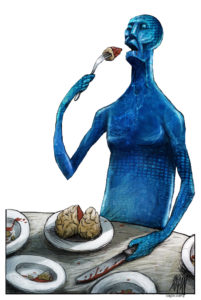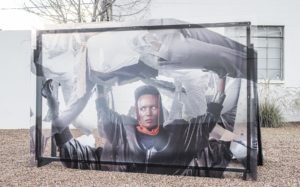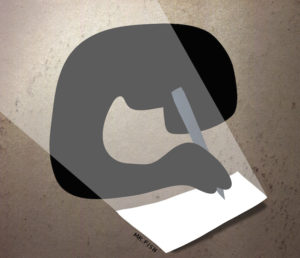Punk Hostages Practice the Healing Power of Literature
Two veterans of L.A.’s punk scene are bringing books and creative writing to institutionalized people in prisons, shelters and recovery programs.
punk hostage (n.): “a hostage to freedom”
On a dusky evening in Echo Park, Calif., in October 2012, Punk Hostage Press hosted its launch reading at Stories Books & Café on Sunset Boulevard. At the time, the press had already put out a handful of books, mostly poetry and stories by founders A. Razor and Iris Berry. Aged denizens of ’80s Hollywood filled the seats on the back patio and spilled out into the alley and parking lot of the bookstore. Razor — burly and tattooed, soft-spoken and shy — read several poems, long, lyrically drenched glimpses of tenuous situations laced with deep remorse. Berry, a natural entertainer, bottle blond, read stories from her book “The Daughters of Bastards,” recounting harrowing and goofy scenes from her childhood and her life in Hollywood in the ’80s. Next to her signature in your book, she leaves a freshly applied pink-lipstick kiss. Her author photo shows her clutching William S. Burroughs’ typewriter against her nude chest — it was taken on the side of a highway.
Berry and Razor founded Punk Hostage Press in 2011. For years, their lives had intersected, with Razor cutting an elusive presence through the Hollywood scene Berry inhabited. By 2011, both were straightening out their lives, and a mutual friend put them back in touch. After meeting for lunch at Canter’s deli in Los Angeles, where they discussed options they had for publishing their work through other presses, Razor sent Berry a text message: “Why don’t we just do it ourselves?” Since then, in the spirit of their punk, do-it-yourself roots, they’ve published more than a dozen books by several authors — editing, formatting, designing and funding everything themselves. They called their operation “Punk Hostage,” merging what they saw to be contradictory terms: “punk” being the essence of freedom and “hostage” its antithesis. The phrase seemed to be a potent representation of absurdity that felt close to home.
As Berry and Razor worked jobs in shelters for homeless men and battered women, they started to feel strongly about bringing literature into the situation as a complement to established recovery programs. At the start of 2013, they announced the launch of a nonprofit organization, Words As Works, dedicated to bringing books and creative writing to institutionalized people in prisons, shelters and recovery programs. Words As Works stemmed from their own use of literature to remove themselves from traumatic situations.
They both credited literature with saving their lives and bringing them out of their own pinholes of institutionalization. They had each spent many years battling drug addictions and had accumulated pasts full of scenes of violence and distress. They are survivors, in other words, and they realized they had something to offer.
Don’t Ever Let a Beatdown Get in the Way of Freedom:
“I hated the system and how oppressive it was, but I realized I had to take fucking responsibility because there was something I couldn’t quit doing, and till I addressed that it didn’t matter what society was tripping on. I finally found a way to be accountable and I don’t think I’d have been able to do that without reading.” — A. Razor
The poet known as A. Razor has spent nine of his 50 years behind bars. For most of his life he supported himself by selling drugs and weapons and running after-hours joints and escort services. He crossed state lines under constant threat of violence and arrest. Meanwhile, he also wrote voluminously, becoming known in underground poetry circles and within the punk rock scene in Hollywood in the ’80s.
In jail he read everything that was available, often nothing more than Bibles, Qurans and supermarket paperbacks. In his cells, he filled thousands of yellow legal pads with writing. Whenever he got moved to another cell, it all got thrown away. (“In jail, if you’re attached to something, it’s going to lead to a not very positive outcome,” he said.)
Into his 40s he was nursing serious drug addictions and kept getting arrested, leading to his last incarceration at San Quentin State Prison in Northern California. At San Quentin, Razor had finally had enough. “I saw the writing on the wall the last time I was arrested. Pretty soon nobody was going to give a fuck. I knew a couple guys like that: they’re never going to get out and people forget about them. I saw that there were worse things than death, and I thought I could do better than spend my dismal end in jail.”
He started to work toward getting sober, which became a process of facing and understanding his traumas. His daily life had for so long been a game of survival, with violent memories lodged in his consciousness: a guy standing next to him on the yard in jail hit in the head and killed by a “warning shot,” friends and lovers dying in front of him from drug overdoses and gunshot wounds. There were also actions Razor had to take to survive, things he speaks about only generally with me.He was helped along by recovery groups offered at a Marin County jail he was incarcerated in before being transferred to San Quentin. Because of his progress, he was able to negotiate an early release date, lopping off several years from his 10-year sentence. He left prison for the last time in 2006. He’s been sober and straight with the law since the day in 2004 when he was last busted.
Razor was born on Christmas Day in Brooklyn in 1963, and shortly afterward, his father was shot dead with his back turned to the door in one of his favorite restaurants. His mother was from Texas. JFK had just been killed in Dallas and everyone in the neighborhood started calling her “Tex.”
She moved the family to Southern California, where Razor wandered the streets of Hollywood in his early teens, starting to cause trouble and bumming around Baroque Books on Hollywood Boulevard, where the owner loaned him copies to read. The men who surrounded him as a child at his home in San Bernardino were bikers, drug dealers and Chicano “low riders” — violent men concerned with dominance. Razor started selling drugs when he was 11 years old.
“I always felt drugs were the way I made money,” Razor said. “I had all kinds of hopes and dreams for other stuff but it seemed like when you were broke the world required that you had money.”
As he got older and more involved as a criminal, Razor started doing poetry readings across the country while traveling on drug and weapon runs. He developed literary contacts and started putting out his poems. After a productive relationship with underground publisher Drew Blood was cut short by Blood’s deteriorating health and eventual death from AIDS, Razor stopped publishing his poetry regularly in 1995. Even after getting released from San Quentin in 2006, Razor didn’t publish much writing again until 2012, when he got back in touch with Berry, who was an old acquaintance from the Hollywood scene (“I sold drugs to her boyfriend”).
One of Razor’s guiding lights when he was trying to straighten out was Bay Area poet/comedian Bucky Sinister. The two had met in 1991 or so: “I ran a poetry reading series and booked him to feature on referral of a mutual nut job,” Sinister said. “Razor showed up not only late, but so late the whole reading was over. We just hit it off right away.”
Sinister was already sober in 2006 when Razor was getting released from San Quentin. He wrote a letter to a judge asking the penal system to go easy on Razor despite his years of criminality. “I mostly wanted him to be in a place with books and access to writing materials and mail,” Sinister said. “That’s not a given in our system. I really didn’t think he was getting out. I don’t remember the letter exactly but I do remember knowing that when he was around poets and writers, his life was much better. When he was around criminals, well, he fell in and did some dumb shit.”
When the legal system did decide to let Razor go, Sinister worried that he would fall back in with old crime associates, merely because it would have been a safe place to land. “There’s an unconditional love among the street level that’s really nice,” Sinister said. “It’s dysfunctional, it will likely lead to some kind of chaotic disaster, but it’s welcoming.”
In L.A., Berry was part of a sober crowd of over-30 punk rockers and writers. Though L.A. had been the scene of many of Razor’s crimes over the years, Sinister knew that Berry’s new environment would help keep Razor afloat.
A Ringling Sister and a Daughter of Bastards:
“This book is dedicated to all the mothers and daughters with no place to go.” — At the top of the dedication list in Iris Berry’s “The Daughters of Bastards”
Berry is a Los Angeles anthropologist — she’s enthralled with the mythos of the city even after living through its muck. In a way, all her writing serves as an ode to L.A. — the scenes in “Chinatown” and the rain over headlights of cars on Hollywood and Highland and the burnt-out abandonment of empty pads where junkies dwelled. When I interviewed her for this piece, she was wearing a Dodgers jersey.
I met up with Berry at Millie’s Cafe on Sunset in Silver Lake, the place where she used to work in the late ’80s through the mid-’90s. She was a waitress there, and some of the dishwashers and busboys included punk rock riffraff such as Bob Forrest (the guy in the hat on “Celebrity Rehab”/lead singer of Thelonious Monster) and Keith Morris (of Black Flag/Circle Jerks/OFF!) during the time they were getting clean.One night, as she and other workers were cleaning up Millie’s after closing time at 2 a.m., a white limousine pulled up to the curb. Slash and Duff McKagan from Guns N’ Roses wanted Berry to go to Vegas with them, and had sent a driver to pick her up from work. “I told the driver I was trying to stay sober, and he said, ‘They’re sober,’ and I looked at him and he said, ‘They’re sober. They’re only drinking white wine.’ ”
Berry grew up in Pacoima. Her parents weren’t usually present and the house was run by her older brothers and their friends, who were tough guys (she called them “thugs”). “The police were always at our house,” Berry said. In her book she writes, “By the time I was six I needed a cocktail and a cigarette, but of course that didn’t happen; I had to wait until I was eleven, like all the other kids in the neighborhood.”
She spent a lot of time writing in her room when she was a kid. “There was no art in Pacoima,” she said, “just crime and crime and crime. Moving to Hollywood and living with squatters was a step up for me. I had a very violent childhood.”
Her mother had run off and gotten married right before Berry decided to leave home. It was the last straw. “Her boyfriend said he wouldn’t marry her as long as she had to take care of kids, so she just left — no more kids!” Berry said.
In the ’80s, Berry became part of the organic meld of creative forces that developed through punk rock in Hollywood. Without any definite designs, she began writing poetry again when she was 21, spurred on by copies of Charles Baudelaire’s “Les Fleurs du Mal” and one of Charles Bukowski’s collections, which she took out from the library and to this day hasn’t returned.
Berry showed some of her writing to friends — “They said, ‘You’re a writer!’ ” — and eventually a few people started coming together with guitars and such, and suddenly she was in a band, The Ringling Sisters. “It was all organic,” Berry said. “We didn’t wait for permission. All you have to do is decide to get onstage and the rest happens from there.” They toured the country and were close to getting a record deal, but it fell through.
Over the years, Berry found herself needing help. She spent some time in women’s shelters, needing to escape abusive relationships. She was active in addiction recovery programs when she met up again with Razor, who came to L.A. and spent a few nights on her floor. She cooked him some hot meals. “We realized we had crossed paths so many times, in so many different ways,” Razor said. “We had very similar interests and histories, and we felt the same way about literature.”
Since then, in Razor’s words, the two of them have developed pretty good lives. Razor works 50 hours a week at a homeless shelter in Oakland, Calif., helping to treat men whose situations include repeated hospitalizations and arrests. “It’s not as simple as AA and welfare checks,” he said. “Their trauma is so deeply ingrained you have to meet them where they’re at. … This kind of program has the potential to develop new ways to help people on a long-term basis. And for the economically minded people: Bringing down the rate of ER visits saves millions of taxpayer dollars. You wonder why there aren’t more people trying to fund it. We can treat people like the valuable resources they are.”
In his off hours he writes and works on things for Punk Hostage. Berry works at a women’s shelter in Los Angeles’ San Fernando Valley. Since 1985, she’s been putting on fundraisers for orphanages, the Red Cross, prostitution rescue group Children of the Night, various rehab facilities and battered women’s shelters. She has received two certificates of merit from the city of Los Angeles for her efforts as an L.A. historian and charity worker.
Words Are Working:
“If it can work for us then it’s evidence it can work for others. We’re not reinventing the wheel — we’re just trying to keep it spinning.” — A. Razor
April Ellis is a case manager at the San Francisco County Jail in San Bruno. She works with inmates who have substance abuse problems and who have lived on the streets. Her brother is a spoken word poet who respected Razor’s work and encouraged her to invite Razor to visit the jail for a reading during National Poetry Month in April.
Razor read to 55 prisoners. He got a standing ovation, and one of the guards even wrote a poem he wanted to share afterward.San Bruno is a very progressive jail. It offers Alcoholics Anonymous and Narcotics Anonymous meetings in certain pods. If you wind up there and you don’t have a high school diploma, officials will bring teachers in to help you get your GED before you leave. Despite some concerns about “off-color language and themes” in Razor’s poems that he had to explain to administrators after that first reading, it looks as if Razor’s relationship with the jail will continue at monthly workshops.
Razor left behind signed copies of his books and helped stock the jail’s library. Ellis said she would have Razor teach workshops there every week if his schedule permitted it. “Some of the guys here tell me straight up, ‘I write to understand myself,’ ” Ellis said in a phone interview. “We give them black wide-ruled composition books and they fill them with poetry and journaling. They say that getting it out of their head and onto paper is the best way to understand themselves. They’re processing why they’re there. Average everyday people don’t go into those kinds of issues — family issues and such — but [the inmates] do.”
Psychiatrist Viktor Frankl’s book “Man’s Search for Meaning,” a study of his time in Nazi concentration camps, remains an important work for Razor. “The people who were able to keep themselves together the best were the ones least attached to the environment they were in,” Razor said. When he was in prison, he adopted this attitude, and used reading and writing to keep his senses sharp.
Razor sees Words As Works as a method to break through the clouds of the system and transcend institutional politics. “If people can empower themselves to heal within this forgotten, written-off part of society then that tool might be powerful enough to help in schools and at-risk youth, and it could be what makes a difference for a whole generation of people,” he said.
Almost every night I see new poems by Razor pop up on my Facebook feed. He tells me he writes them on the computer when he finishes his shifts, sometimes at 4 in the morning.
“The hardest job I ever had in this country was being a homeless person with no money … ” he explains to me. “I’m going to see if I can pull someone out with me and if I can document it and use that to get more results and help more people.”
Your support matters…Independent journalism is under threat and overshadowed by heavily funded mainstream media.
You can help level the playing field. Become a member.
Your tax-deductible contribution keeps us digging beneath the headlines to give you thought-provoking, investigative reporting and analysis that unearths what's really happening- without compromise.
Give today to support our courageous, independent journalists.






You need to be a supporter to comment.
There are currently no responses to this article.
Be the first to respond.